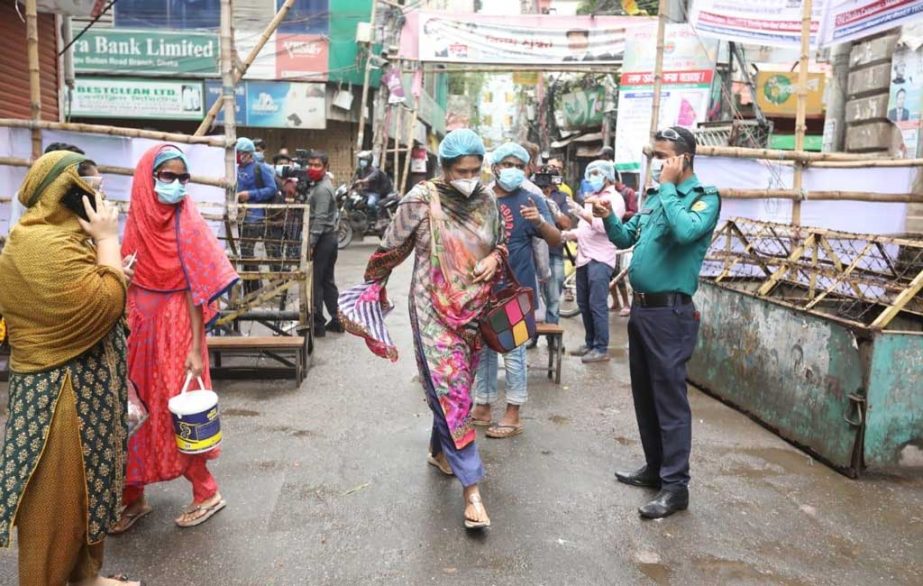
UNB, Dhaka :
Though a nationwide lockdown has been enforced in Bangladesh for one week with a high hope to limit the spread of deadly Coronavirus, health experts think that this ‘unscientific and halfhearted’ lockdown is unlikely to yield any positive result.
They said the widespread movement of people, demonstrations and public gatherings at kitchen markets and other places on the first day of lockdown have exhibited that people did not take this “partial” shutdown seriously since offices, factories and Amar Ekushey Book Fair are open.
The experts suggested enforcing a complete lockdown for 14 days shutting down all the offices, mills, factories, book fair and businesses, except those engaged in emergency services, and enforcing it strictly by involving public representatives to break the Covid transmission cycle.
A nationwide lockdown for a week was enforced on Monday morning as part of a move to slow down the rapid spike in both coronavirus infection and mortality rates.
It is the first official lockdown in Bangladesh to tamp the virus. On March 26 last year, the government had declared general holidays along with a transport shutdown instead of enforcing lockdown as the country was witnessing the surge in coronavirus transmission.
‘Halfhearted’ lockdown unproductive
Talking to UNB, Prof Muzaherul Huq, a former adviser to WHO South-East Asia region, said: “We can’t call it a lockdown since the government has kept mills, factories, offices and even the book fair open. This is not the scientific way to restrict public movement.”
He said lockdown means controlling the movement of people completely. “Lockdown means everything will be closed. Only some important emergency services, drugstores and certain markets from where people can buy food can remain open.”
Muzaherul said the seven-day restriction enforced by the government does not match with the principle and definition of lockdown. “It’s an unscientific, unplanned and halfhearted lockdown. It won’t help the nation get success in containing the virus transmission.”
Noted virologist Prof Nazrul Islam, also a member of the National Technical Advisory Committee, said lockdown is a universally accepted system to control the movement of people by shutting down everything, except emergency services.
He said it seems the government enforced a partial lockdown keeping many things open. “A partial lockdown can be enforced in any particular area, not across the country. It’ll be only waste of energy, loss of money. The desired goal can’t be achieved with it.”
Prof Nazrul said people did not take the lockdown seriously as there is no strong monitoring and enforcement of laws to implement the lockdown.

Lockdown should be 14 days
Public health expert MH Chowdhury (Lenin), chairman of the medicine department at the Health and Hope Hospital, said a complete lockdown should be enforced for at least 14 days to slow down the virus transmission.
“Two weeks are an incubation period for coronavirus in human bodies. So, the virus transmission cycle can’t be broken with a seven-day lockdown,” he said.
Lenin said people violated the restriction enforced by the government for seven days on the very first day as there is no seriousness among them about the shutdown.
“I think the government should immediately work out effective plans to enforce a strict lockdown. Law enforcers should enhance their monitoring so that no one can come out of home without any genuine need. A situation should be created so that people don’t dare to go outside unnecessarily. Or else, we can’t achieve anything from the relaxed lockdown.”
Engaging public representatives
Prof Nazrul Islam said it is not possible for the law enforcement agencies alone to implement the lockdown without the cooperation and involvement of people at every level, especially the public representatives. “But the government has not taken any step to engage public representatives to enforce the lockdown.”
He said a monitoring team should be formed at every locality to enforce the lockdown and stop the unnecessary public movement.
Prof Nazrul Islam said the government should come up with directives about how the local public representatives and administration can stand by poor people being hit hard by the shutdown. “People will come out if there’s no food at their homes.”
Besides, the expert said, there should be a clear directive as to how people will buy food and necessary items amid the lockdown maintaining health safety rules.

